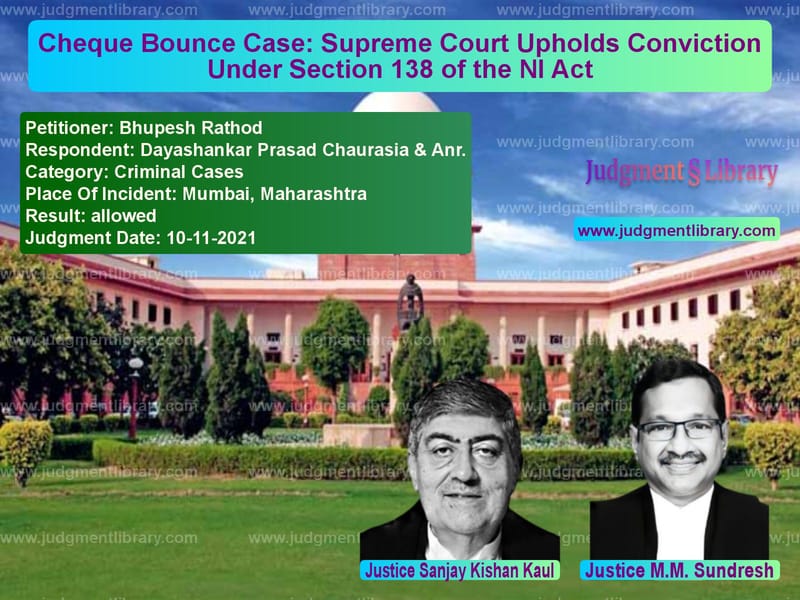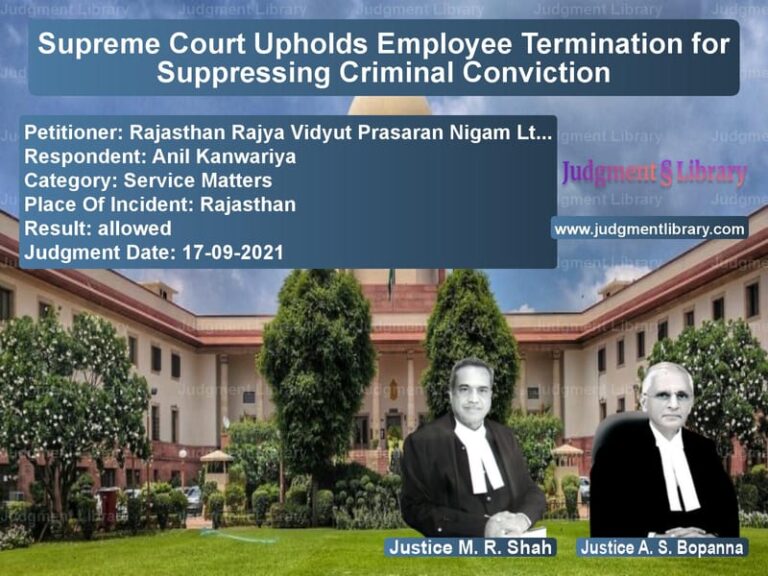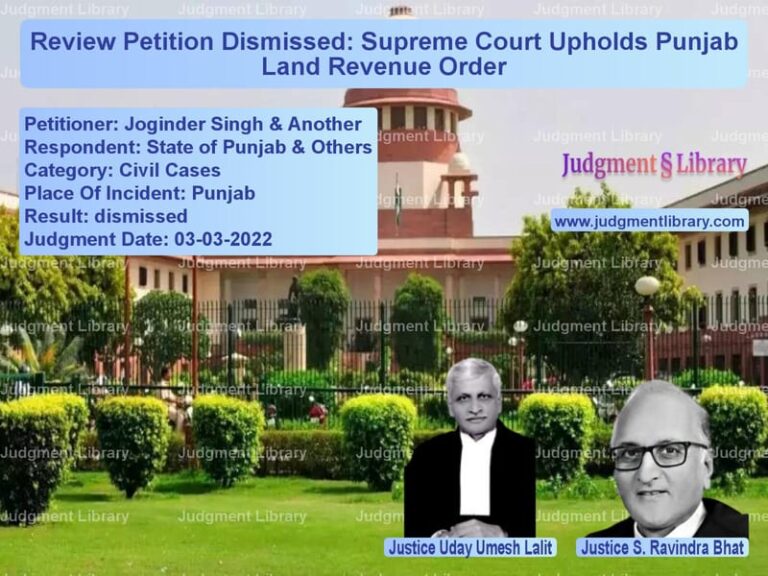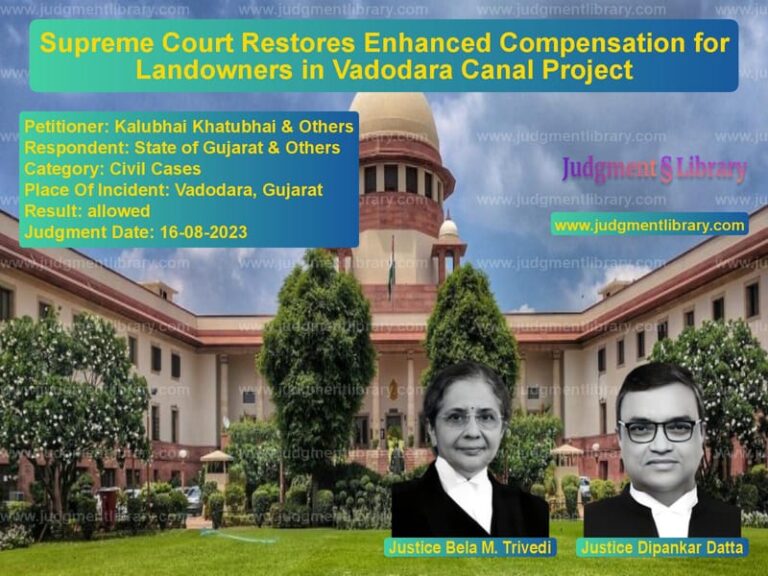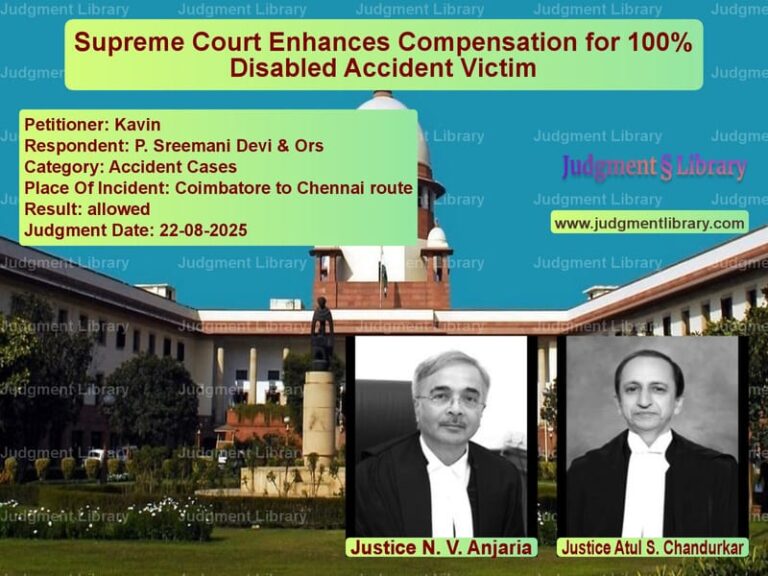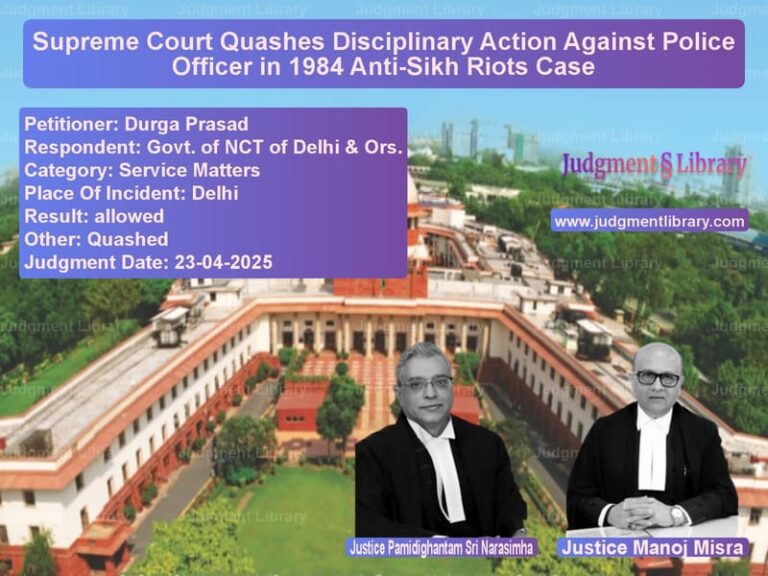Cheque Bounce Case: Supreme Court Upholds Conviction Under Section 138 of the NI Act
The Supreme Court of India, in a significant judgment, upheld the conviction of Dayashankar Prasad Chaurasia under Section 138 of the Negotiable Instruments Act, 1881. The case involved dishonored cheques totaling ₹1,60,000, issued in favor of M/s Bell Marshall Telesystems Ltd.. The ruling was delivered by a bench comprising Sanjay Kishan Kaul and M.M. Sundresh. The judgment reinforced the importance of procedural compliance while also ensuring that minor technicalities in filing a complaint do not obstruct justice.
This case underscores the significance of financial discipline and legal obligations under the Negotiable Instruments Act. It also clarifies the procedural requirements for filing complaints under Section 138 and affirms the duty of courts to uphold the integrity of financial transactions.
Background of the Case
The case originated when the respondent, Dayashankar Prasad Chaurasia, issued eight cheques of ₹20,000 each in favor of M/s Bell Marshall Telesystems Ltd.. The cheques were drawn on HDFC Bank, Vasai (E) Branch, Mumbai. They were presented for payment on May 10, 2006, but were dishonored on May 12, 2006, due to insufficient funds.
Read also: https://judgmentlibrary.com/supreme-court-commutes-death-sentence-in-karnataka-rape-and-murder-case/
Following the dishonor of the cheques, the complainant, Bhupesh Rathod, the Managing Director of Bell Marshall Telesystems Ltd., issued a legal notice to the respondent under Section 138(b) of the NI Act on May 26, 2006. However, the respondent failed to meet the demand within the statutory 15-day period and did not respond to the notice.
As a result, a complaint was filed before the Special Metropolitan Magistrate, Mumbai, on July 7, 2006. The complaint was accompanied by a Board Resolution dated May 17, 2006, authorizing Bhupesh Rathod to initiate legal action on behalf of the company.
Legal Issues Raised
The defense raised several objections regarding the maintainability of the complaint:
- The complaint was allegedly filed by Bhupesh Rathod in his personal capacity rather than on behalf of the company.
- The Board Resolution submitted as evidence was unsigned.
- The company’s authority to grant loans was unclear, raising doubts about the validity of the financial transaction.
Trial Court’s Decision
The trial court, in its judgment dated March 12, 2009, acquitted the accused, citing two primary reasons:
- No documentary evidence, apart from a promissory note, was presented to prove that the company had advanced a loan to the respondent.
- The Board Resolution authorizing the complaint was not signed by the company’s directors.
High Court’s Judgment
The complainant, Bhupesh Rathod, challenged the acquittal before the Bombay High Court. However, the High Court dismissed the appeal on August 3, 2015, reasoning that:
- The complaint was not filed by the payee or holder in due course, as required under Section 142(a) of the NI Act.
- The company was the payee, yet the complaint was filed by Bhupesh Rathod personally.
- The company’s financial authority to advance loans was questionable.
Supreme Court’s Observations
The Supreme Court took a different view and overruled the High Court’s decision. The Court held:
“The respondent not having disputed his signatures on the cheques, it was for the respondent to show in what circumstances the cheques had been issued.”
The Court emphasized that once a signed cheque is presented, a presumption arises under Section 139 of the NI Act that it was issued for a legally enforceable debt unless the accused proves otherwise. The burden of proof shifts to the accused to demonstrate that the cheque was not issued for any financial liability.
The Court also noted that procedural defects in the format of the complaint should not be used as a technical loophole to escape liability. It held that:
“The format of the complaint does not override the substantive aspect of the case. The presence of a Board Resolution and the complainant’s authority to file the case was sufficient to establish its maintainability.”
Final Judgment
The Supreme Court set aside the acquittal and convicted the accused under Section 138 of the NI Act. The Court imposed the following penalties:
- One-year imprisonment for the accused.
- A fine of ₹3,20,000 (twice the cheque amount).
- An option to avoid imprisonment by paying an additional ₹1,60,000 to the complainant.
- Legal costs payable to the complainant.
Significance of the Ruling
This ruling serves as an important precedent in cases related to dishonored cheques under the NI Act. Key takeaways from the judgment include:
- Presumption of Liability: Once a cheque is dishonored, the onus is on the drawer to prove that it was not issued for a legally enforceable debt.
- Technicalities Cannot Defeat Substantive Justice: The courts should not dismiss genuine cases due to minor procedural errors.
- Corporate Complaints: When a company is the payee, complaints can be filed through authorized officials, provided proper authorization is established.
- Strict Compliance with Negotiable Instruments Act: The judgment reaffirms that entities issuing cheques must honor their financial obligations or face strict legal consequences.
Conclusion
The Supreme Court’s ruling in this case reinforces the necessity of financial discipline and legal accountability. The judgment highlights that minor procedural lapses should not obstruct justice, and individuals or entities issuing cheques must honor their financial commitments. This case sets a crucial precedent for businesses and individuals engaged in financial transactions through cheques.
Petitioner Name: Bhupesh Rathod.Respondent Name: Dayashankar Prasad Chaurasia & Anr..Judgment By: Justice Sanjay Kishan Kaul, Justice M.M. Sundresh.Place Of Incident: Mumbai, Maharashtra.Judgment Date: 10-11-2021.
Don’t miss out on the full details! Download the complete judgment in PDF format below and gain valuable insights instantly!
Download Judgment: bhupesh-rathod-vs-dayashankar-prasad-c-supreme-court-of-india-judgment-dated-10-11-2021.pdf
Directly Download Judgment: Directly download this Judgment
See all petitions in Cheque Dishonour Cases
See all petitions in Fraud and Forgery
See all petitions in Judgment by Sanjay Kishan Kaul
See all petitions in Judgment by M.M. Sundresh
See all petitions in allowed
See all petitions in supreme court of India judgments November 2021
See all petitions in 2021 judgments
See all posts in Criminal Cases Category
See all allowed petitions in Criminal Cases Category
See all Dismissed petitions in Criminal Cases Category
See all partially allowed petitions in Criminal Cases Category

